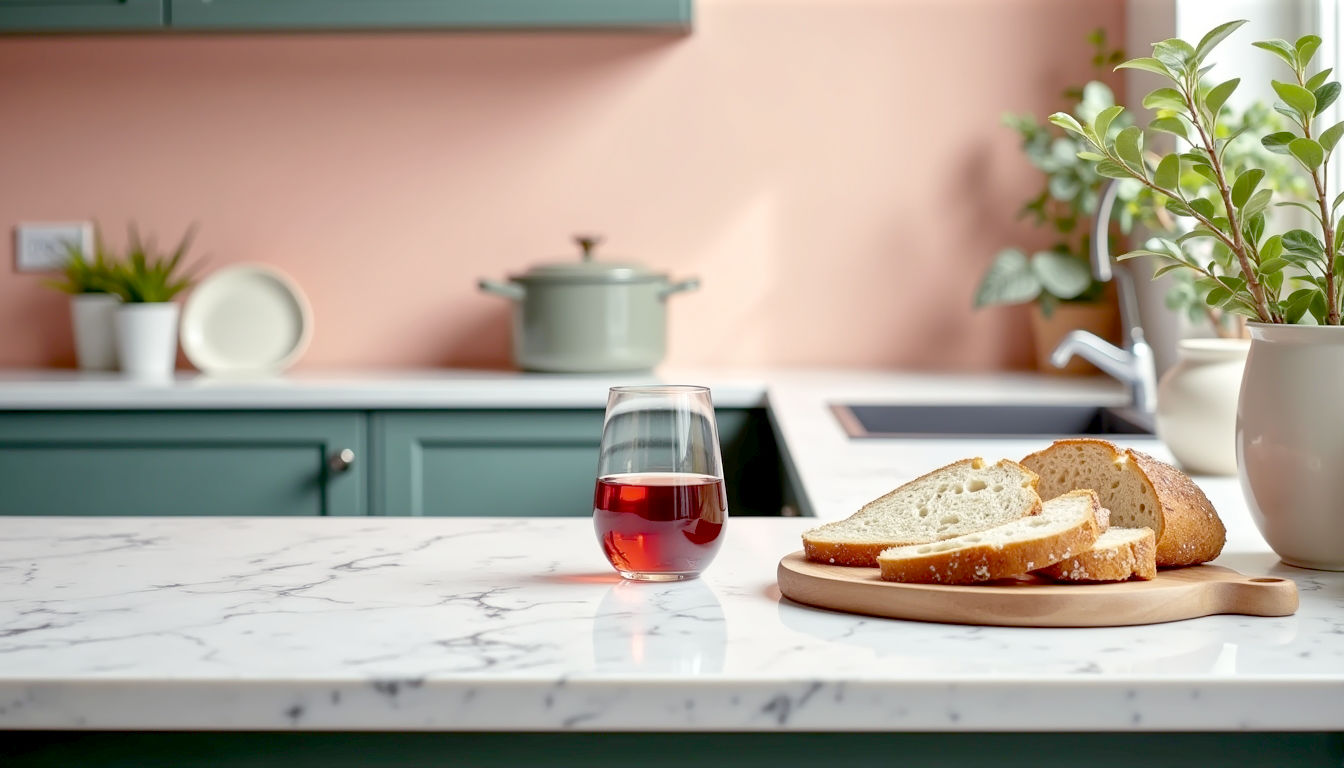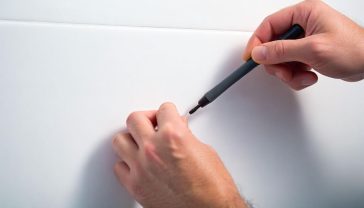The Great British Worktop Showdown: Which Kitchen Countertop is a True Star Baker?
Discover the toughest kitchen worktops on the market. We break down the pros and cons of granite, quartz, porcelain, and ultra-compact surfaces for UK homes.

This post may contain affiliate links. If you make a purchase through these links, we may earn a commission at no additional cost to you.
Picture this: it’s a drizzly Tuesday evening. You’re halfway through wrestling a shepherd’s pie into the oven, the kids are demanding a snack, and you’ve just sloshed a bit of red wine near the kettle. Your kitchen worktop is at the heart of this beautiful, chaotic scene. It’s not just a slab of stone or wood; it’s the stage for your daily life. It’s where you chop, spill, lean, and occasionally rest a dangerously hot pan when you can’t find a trivet.
So, when it comes to choosing a new one, durability isn’t just a nice-to-have—it’s everything. You need a surface that can handle the heat, shrug off stains, and resist the odd scrape from a stray knife. But with so many options out there, from glimmering quartz to rustic wood, how do you sort the champions from the chancers?
Welcome to the ultimate guide to finding the most durable kitchen worktop for your home. We’re going to slice and dice the marketing jargon and get down to what really matters. We’ll look at the toughest materials on the market, how they stand up to the trials of a busy British kitchen, and which one will still be looking spick and span for years to come. Forget the fads; we’re on a mission to find a worktop that’s as tough and reliable as a well-made cuppa.
What Does ‘Durable’ Actually Mean for a Worktop?
Before we jump into comparing materials, let’s agree on what we’re looking for. When we say a worktop is durable, we’re talking about its ability to withstand the daily grind. It’s a bit like judging a contestant on The Great British Bake Off—it needs to perform well across several key challenges.
Here are the main tests a truly durable worktop must pass:
- Scratch Resistance: Can it handle a dragged ceramic bowl or an accidental slip of a vegetable knife? A durable worktop shouldn’t scratch easily.
- Heat Resistance: Can you briefly place a hot pan on it without causing scorch marks, cracks, or discolouration? This is a big one for busy cooks.
- Stain Resistance: How does it cope with spills like curry, red wine, coffee, or lemon juice? A non-porous surface won’t let liquids seep in and leave a permanent mark.
- Impact Resistance: What happens if you accidentally drop a heavy tin of beans or a cast-iron skillet? A tough worktop will resist chipping and cracking.
- Chemical Resistance: Will it be damaged by common household cleaners or acidic foods?
Some materials are star bakers in one category but fail spectacularly in another. The perfect worktop is an all-rounder—a surface that can take whatever you throw at it and still look great. Now, let’s meet the contenders.
The Titans of Durability: Meet the Toughest Materials
When it comes to sheer toughness, a few materials consistently top the charts. These are the heavyweights of the worktop world, engineered or naturally formed to withstand incredible stress.
1. Ultra-Compact Surfaces (The Unbeatable Champion)
If this were a superhero movie, ultra-compact surfaces would be Captain Marvel—absurdly powerful and virtually indestructible. You might know them by brand names like Dekton, Neolith, or Lapitec.
These surfaces aren’t found in nature. They’re man-made marvels created using a process called sintering. Imagine taking all the best bits of granite, quartz, and porcelain, grinding them into a fine powder, and then squashing them under immense pressure and baking them at extreme temperatures. It’s like fast-forwarding the geological process that creates natural stone by thousands of years.
The result? A slab that is incredibly dense and completely non-porous.
Why it’s a durability champion:
- Heatproof: You can place a pan straight from the hob onto it. Seriously. Its melting point is sky-high, so you’ll never see a scorch mark.
- Scratch-Proof: It’s one of the most scratch-resistant materials you can buy. You could chop vegetables directly on the surface (though you’d blunt your knives!).
- Stain-Proof: Because it has zero porosity, nothing can seep in. Red wine, turmeric, permanent marker—it all just wipes away.
- UV Resistant: The colour won’t fade over time, even if it’s in a sun-drenched kitchen. This makes it one of the few materials suitable for outdoor kitchens too.
- Impact Resistance: It’s incredibly strong, though not entirely unbreakable. A very heavy object dropped on an edge could potentially cause a chip, but it’s far less likely than with other materials.
Any downsides? The main drawback is the price. This level of performance comes at a premium, often making it the most expensive option. It also requires specialist installers who know how to handle it, as its rigidity can make it tricky to cut and fit. The patterns are printed on the surface, so the design doesn’t run all the way through the slab (unlike quartz or granite). This means the edge will have a solid colour, not the veined pattern of the top.
Verdict: For pure, unadulterated durability, ultra-compact surfaces are the undisputed kings. If your budget can stretch, you simply cannot buy a tougher worktop.
2. Sintered Stone & Porcelain (The Sleek Contender)
Often grouped with ultra-compacts, porcelain and sintered stone worktops are close cousins. They are also created by firing minerals at incredibly high temperatures, resulting in a hard, non-porous surface. Think of your finest porcelain teapot, but engineered to be as tough as nails.
Brands like Laminam and XTONE are popular choices here. They are loved for their ability to mimic the beautiful, delicate veining of marble without any of the fragility.
Why it’s a top performer:
- Excellent Heat Resistance: Like ultra-compacts, porcelain can handle hot pans without any trouble.
- Superb Scratch Resistance: It’s very difficult to scratch, keeping its finish for years.
- Completely Stain-Proof: Its non-porous nature means spills are never a problem.
- Lightweight and Versatile: It can be made in much thinner slabs than stone, giving a sleek, minimalist look. It’s also great for creating seamless splashbacks.
Any downsides? While it’s incredibly tough, its main vulnerability is to chipping on the edges. Because it’s so rigid and often installed in thin profiles, a sharp, heavy impact right on the corner can cause a chip. Some patterns are only surface-deep, similar to ultra-compacts, though technologies are improving this. The cost is also at the higher end of the market.
Verdict: A fantastic choice for a modern, busy kitchen, especially if you love the look of marble but need something far more practical. It’s a top-tier performer, just be a little mindful of the edges.
3. Quartz (The People’s Champion)
Quartz is probably the most popular premium worktop material in the UK right now, and for good reason. It strikes a fantastic balance between stunning looks, excellent durability, and reasonable cost.
Unlike granite, quartz is an engineered stone. It’s made from about 90-95% crushed natural quartz (one of nature’s hardest minerals) mixed with polymer resins and pigments. This mixture is poured into a mould, compressed, and cured to create a solid, non-porous slab. Popular brands include Silestone, Caesarstone, and Cambria.
Why it’s so popular:
- Highly Scratch-Resistant: The natural quartz content makes it incredibly hard and difficult to scratch.
- Excellent Stain Resistance: The resins make the surface non-porous, so it’s hygienic and resistant to staining from everyday spills. Lemon juice and vinegar should still be wiped up promptly, as strong acids can sometimes affect the resin.
- Consistent and Versatile Look: Because it’s man-made, you can get it in a huge range of colours and patterns, from pure white to slabs that perfectly mimic marble or concrete. The appearance is uniform, so what you see in the showroom is exactly what you get.
- Low Maintenance: It never needs to be sealed. Just a simple wipe-down with soap and water is all it takes to keep it looking new.
Any downsides? The main weakness of quartz is its vulnerability to extreme heat. The resins used in its construction can be damaged by temperatures above about 150°C. This means you should never place a hot pan directly from the hob or oven onto it. Always use a trivet or chopping board. Prolonged exposure to direct sunlight can also cause some colours, particularly darker ones, to fade or yellow over time.
Verdict: Quartz is a brilliant all-rounder and arguably the best choice for most families. It offers fantastic durability for its price point, looks amazing, and is incredibly easy to live with. Just remember that one golden rule: no hot pans!
4. Granite (The Classic Powerhouse)
For decades, granite was the undisputed king of high-end kitchens. It’s a 100% natural stone, hewn from the earth in giant blocks, sliced into slabs, and polished to a beautiful sheen. Each piece is unique, with its own character, fissures, and mineral flecks.
Granite is an igneous rock, formed from cooled magma, which makes it incredibly hard and dense.
Why it remains a great choice:
- Very High Scratch Resistance: Granite is one of the hardest natural stones, second only to diamond. It’s very difficult to scratch.
- Excellent Heat Resistance: You can place hot pans on granite without worrying about damage. It was born from heat, after all.
- Natural Beauty: No two slabs of granite are the same. You get a unique, one-of-a-kind surface that adds real character to your kitchen.
Any downsides? Granite’s main drawback is its porosity. Because it’s a natural stone, it has tiny pores that can absorb liquids if it’s not properly sealed. This can lead to staining, especially with dark liquids like red wine or oil. Most granite worktops will need to be sealed upon installation and then resealed every year or two. This is a simple DIY job, but it’s a piece of maintenance you don’t have with quartz or porcelain. Some darker, denser granites are less porous and may not even need sealing.
It can also be chipped or cracked by a severe impact, though this is rare. Repairing it can be tricky. Finally, as a natural product, the slab you get might have variations you didn’t see in the small showroom sample. It’s always best to view and approve the exact slab that will be used for your kitchen.
Verdict: If you love the unique, natural beauty of real stone and don’t mind a tiny bit of annual maintenance, granite is a fantastically durable and timeless choice. Its heat resistance gives it a key advantage over quartz for serious cooks.
Other Materials: Where Do They Stand?
What about the other popular worktop materials? While beautiful in their own right, they generally don’t compete with the top four for all-round durability.
Solid Surface (e.g., Corian)
Made from a blend of acrylic resins and minerals, solid surface worktops are prized for their ability to be seamlessly joined. This means you can have integrated sinks and no visible joins, creating a smooth, flowing look. They are non-porous and stain-resistant. However, they are much softer than stone or quartz and scratch quite easily. The good news is that scratches can be sanded out, but this is a level of maintenance most people would rather avoid. They also have poor heat resistance.
Hardwood
Wooden worktops bring a wonderful warmth and rustic charm to a kitchen. Tough woods like oak, beech, and walnut can last for years if properly cared for. But that’s the catch: they require significant maintenance. They must be regularly oiled to prevent them from drying out, cracking, and absorbing stains. They are easily scratched, dented by dropped objects, and can be scorched by hot pans. Water damage around the sink is also a common problem if they aren’t perfectly sealed. They are durable in the sense that they can be sanded down and re-oiled to look like new, but they are far from a wipe-and-forget surface.
Laminate
Modern laminate worktops are a world away from the cheap, flimsy versions of the past. High-pressure laminate (HPL) offers decent resistance to stains and scratches for a very low price. However, it’s still the least durable option. The core is just chipboard, so if a deep scratch or cut penetrates the top layer, water can get in and cause the chipboard to swell and bubble. It also has very poor heat resistance, and scorch marks are permanent. It’s a great budget option, but it can’t compete with the titans of toughness.
Stainless Steel
Found in every professional kitchen for a reason, stainless steel is completely heatproof, stain-proof, and hygienic. It’s the definition of a practical, hard-wearing surface. So why don’t we all have it at home? Mainly for aesthetic reasons. It can look cold and clinical, and it scratches very easily. While these fine scratches develop into a uniform patina over time, many people dislike the initial look. It also shows every single fingerprint.
The Final Verdict: Which Worktop Wins the Durability Crown?
So, after reviewing all the evidence, which worktop should you choose if durability is your number one priority?
- The Ultimate Durability Winner: Ultra-Compact Surfaces (e.g., Dekton). If money is no object, this is the toughest, most resilient material you can put in your kitchen. It’s virtually indestructible.
- The Best All-Rounder: Quartz. For most people, quartz offers the perfect blend of exceptional durability, stunning looks, zero maintenance, and a price that’s premium but not eye-watering. Its only real weakness is direct heat, but with basic care (using a trivet), it will look flawless for decades.
- The Best for Natural Stone Lovers: Granite. If you value the unique beauty and heat resistance of real stone, granite is a superb choice. As long as you commit to sealing it every couple of years, it will handle everything a busy kitchen can throw at it.
Choosing a worktop is a big decision. It’s a long-term investment that defines the look and feel of your kitchen. By focusing on these top-tier durable materials, you can be confident that you’re choosing a surface that isn’t just a pretty face, but a true workhorse that will be the heart of your home for many years to come.
Further Reading
For those who wish to delve deeper into the specifics of kitchen design and materials, these resources are highly regarded within the UK:
- Houzz UK: A fantastic resource for design inspiration and finding reputable local kitchen fitters and suppliers.
- Ideal Home: A trusted British publication offering practical advice and trend guides for all aspects of home renovation, including kitchens.
- Which? Kitchens: The consumer champion provides impartial reviews and buying guides for kitchen components, from appliances to worktops.
- The Natural Stone Institute: For in-depth technical information about granite and other natural stones.






